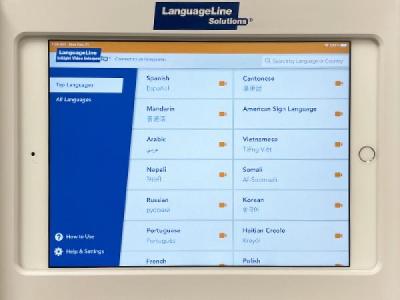
A global network of language interpreters to help communicate medical information between patients with limited English proficiency and clinicians.
Richmond Hospital welcomed a new team member during the pandemic, and one who never gets sick, can speak over 200 languages and can work 24/7 without taking a break.
The Interpreter on Wheels (IOW), as it is called, is a tablet mounted to a rolling platform that connects to a fee-for-service, usage-based online platform in which human interpreters located anywhere in the world can provide confidential interpretation services via video and audio streaming.

The online service used for the Interpreter on Wheels can also be accessed on smartphones and standalone tablets.
Vancouver Coastal Health (VCH) clinician Dr. Matthew Kwok led a quality improvement project at Richmond Hospital—published in BMJ Open Quality in February 2021—that examined the use of an IOW in the hospital’s emergency department (ED). Completed in partnership with VCH Virtual Health and PHSA Provincial Language Service, the project was rolled out just after the start of the COVID-19 pandemic.
“Interpretation has always been a great need at Richmond Hospital, and one that has increased in recent years due to changing demographics in the surrounding area and the hospital’s proximity to Vancouver International Airport,” says Kwok, who has been an emergency physician at Richmond Hospital for the past 15 years.
The aim of Kwok’s project was to decrease the hospital’s reliance on health care staff as ad hoc interpreters, and improve communication between ED staff and patients with limited English language skills.
“To be heard and understood is very important for patients’ quality of care.”
Prior to the introduction of the IOW, Kwok’s investigation revealed that several ED nurses who speak Mandarin or Cantonese were being pulled away from their nursing duties for over half an hour per shift to provide interpretation assistance.
“A lot of times we would use the hospital’s PA system to find a staff member who could help interpret into the language spoken by the patient,” says Kwok. “This is a very inefficient use of resources, as staff should not be interrupted in the course of doing their job to act as ad hoc interpreters.”
The IOW was able to relieve some of this pressure by taking over interpretation duties. During their two-month investigation, Kwok and his team recorded 477 virtual interpretation encounters between the IOW and patients in the ED for a total of 4,123 minutes of interpretation—the majority of which was in Mandarin (54 per cent) or Cantonese (29 per cent).
Staff and patients at the hospital gave the IOW a satisfaction score of 4.43 out of five, Kwok’s project found. In one instance, a deaf patient who was able to use American Sign Language to communicate with staff at the hospital through an IOW interpreter about the pain he was experiencing was brought to tears.
“The patient used to have to use a pen and paper to communicate with us,” shares Kwok. “After the first time using the IOW, he broke down and cried. He was so happy to have a better and faster means of communication than writing back and forth.”
A technology to better serve the shifting needs of Richmond residents
Richmond’s population grew by over 30,000 people between 2011 and 2021, according to recent estimates. Around 76 per cent of residents belong to a visible minority group, of which more than half speak either Mandarin or Cantonese.
Kwok’s project concluded that the IOW can help meet the language interpretation needs of this multicultural patient population, and safeguard against the misallocation of staff time.
The IOW is also an infection control-safe intervention that has added advantages when measures to prevent the spread of diseases, such as the COVID-19 virus, require limiting non-essential face-to-face interactions with patients as much as possible, notes Kwok.

The IOW’s usefulness resulted in greater demand for it among ED team members than expected—“including consulting physicians, social workers, admitting clerks, respiratory therapists and pharmacy technicians.” A request has been made for a second IOW in the ED, and other departments at Richmond Hospital, including Obstetrics and Gynecology, have expressed interest in IOWs, as well.
The success of the device has spurred Kwok to advocate for ongoing funding for the IOW, and to continue tracking and optimizing its performance.
“Miscommunication can cost a lot of money in terms of misdiagnosis and longer hospital stays,” he says. “So even though the IOW costs money, I believe that it is money well spent.”


